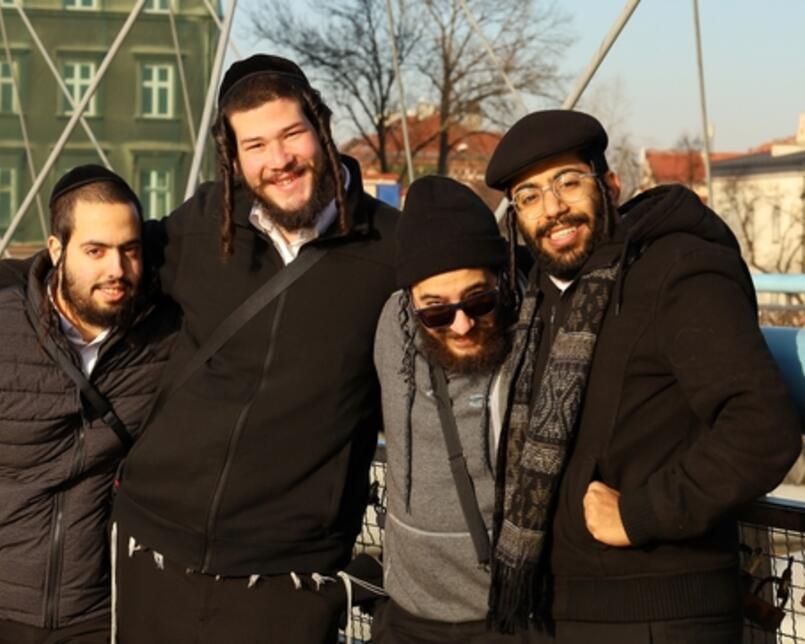Remembering the Holocaust remains an important part of the Jewish identity of Jews across Europe and has a vital role in Jewish revival across the continent. Poland makes an especially interesting case.
Isabel Sawkins
and test your family's knowledge of Jews worldwide while reading the Haggadah!
Isabel Sawkins
On 27th January, countries across the world mark International Holocaust Remembrance Day and remember the victims of the Holocaust. Across Europe, despite changing political leadership and agendas, commemorating the Holocaust’s victims remains an important part of European identity. For Jews, it is even more crucial to commemorate the Holocaust, as demonstrated in JPR’s 2022 mini report, Why be Jewish? The essential Jewish values and ideas of Europe’s Jews. Using data from JPR’s study of European Jewish identity, the mini report highlights the importance of ‘remembering the Holocaust’ to one’s Jewish identity: 78% of the 16,395 self-identified Jewish participants in 12 EU countries (including the UK) said that it is a ‘very important’ aspect of their Jewish identity, with the three highest figures in the Netherlands (85%), France (84%), and Poland (83%). Along the same lines, the second most significant aspect for them was ‘fighting antisemitism’, as 73% of all respondents said it is ‘very important’ to their Jewish identity.
Out of the three countries mentioned, Poland makes an especially interesting case. The desire of the Polish Jewish population to remember the Holocaust is clearly understandable, considering the centrality of Nazi-occupied Poland to the extermination of Europe’s Jews. This included the near total eradication of Poland’s own Jewish population (it is estimated that before the outbreak of the war 3.3 million self-identifying Jews lived in Poland; only about 100,000 of them survived the Holocaust). Following the end of the war, several antisemitic attacks on the Jewish population took place, most notably the 1946 Kielce pogrom. In 1968 approximately half of Poland’s remaining Jews were effectively forced out of the country by communist leader Władysław Gomułka. Community life was shattered as Jewish population numbers were severely depleted, and many of those who remained had to suppress their Jewish identity and hide their roots. By 2020, only about 4,500 self-identifying Jews remained in Poland.
And yet, despite this era of concealment, many maintain that Jewish life in Poland today is experiencing something of a revival, and Holocaust memory is playing a vital role. Many of the most well-known sites of the Holocaust are home to state-sponsored museums, with the Jewish community tending to organise its activities beyond the physical sites of murder. For example, the Festiwal Kultury Żydowskiej (Festival of Jewish Culture) is an annual event which has been held in Kraków since the 1980s, and its programme features talks and lectures on the Holocaust. Another Jewish organisation dedicated to remembering the tragedy is the Towarzystwo Społeczno - Kulturalne Żydów w Polsce (The Social and Cultural Association of Jews in Poland [TSKŻ]) which organises Holocaust remembrance events as part of its Dni Pamięci (Days of Remembrance) activities across Poland.

This effort shown by the Polish Jewish community to remember the Holocaust is even more important given the attempts by the Polish state to limit discussion of the Holocaust. In 2018, a law was introduced according to which it became criminal to accuse the Polish state of complicity with Nazi Germany. In 2021, a bill was passed prohibiting Jews from claiming property restitution, with Polish prime minister Mateusz Morawiecki yet again distancing Poland from the crimes of the Holocaust by saying that “I can only say that as long as I am the PM, Poland will surely not pay for the German crimes. Not a zloty, not a euro, not a dollar.”
Holocaust memory in Poland is thus challenged and threatened by the state, and yet as the findings from the 2018 European Union Agency for Fundamental Rights (FRA) survey show, the Jewish community in Poland continues to value the commemoration of the tragedy and has developed worthy initiatives to remember it.
Holocaust memory in Poland is thus challenged in different ways by the state, and yet as the findings from the 2018 European Union Agency for Fundamental Rights (FRA) survey show, the Jewish community in Poland continues to value the commemoration of the tragedy and has developed worthy initiatives to remember it. It remains to be seen in the upcoming equivalent FRA survey scheduled for this year, whether the increasing control of the state has strengthened, weakened, or had no impact on the Polish Jewish community’s desire to remember.
Despite the fact that the UK is no longer part of the EU, JPR’s Research Panel members will be invited to participate in a UK-specific version of the 2023 FRA survey later this year, which is being coordinated by our team. It is designed to allow Jews across the country to report on their experiences and perceptions of antisemitism in the UK, and to generate data to support work designed to combat antisemitism.
Want to make your opinions count? Join the JPR Research Panel and we will notify you when our antisemitism in the UK survey is live.
Former Research Fellow
Former Research Fellow
Isabel managed JPR’s research panel and survey research programme in the UK. She has an MA in Political Sociology (Russia and Eastern Europe) from University...
Read more